|
The Great War
News Reports From the Front
100 Years Ago This Month
February 1915
February 1
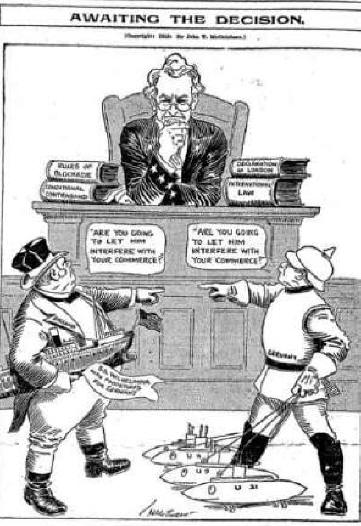 Once again British interest in the military activities on the continent has been overshadowed momentarily by the fact that Germany has brought the combat to Great Britain's front door - the new German policy of the submarine
blockade of British ports. Two British merchantmen torpedo by the Germans near Belfast are the largest commercial vessels that have yet fallen victim to German submarines; the three ships sunk in the Irish Sea were all small coasters. Once again British interest in the military activities on the continent has been overshadowed momentarily by the fact that Germany has brought the combat to Great Britain's front door - the new German policy of the submarine
blockade of British ports. Two British merchantmen torpedo by the Germans near Belfast are the largest commercial vessels that have yet fallen victim to German submarines; the three ships sunk in the Irish Sea were all small coasters.
The Germans, flush with their success in torpedoing British merchant vessels, have warned neutral shipping to keep away from the north and west coast of France and advised them to track north into the North Sea to avoid being sunk by mistake by German submarines, which are said to be operating off the western and northern
coast of France.
Germany's declaration of a naval war zone around Great Britain and Ireland, including the English Channel is regarded in Washington as one of the most serious developments of the war.
While it was noted that the German proclamation was directed against "enemy ships," it also applies to ships flying "neutral flags" where there is suspicion that neutral flags are being misused by enemy ships.
Germany's declaration that the waters around England are a war zone contains no threat to American shipping. So far as neutral shipping is concerned, the German declaration serves merely as a warning of the risks involved in navigation of those waters.
There is no precedent on dealing with the submarine question, because international maritime law only addresses actions of ordinary warships not submarines. The ordinary practice in taking prizes and dealing with the merchant ships are clearly set out and establish by long usage - the merchantmen must be halted; boarded and
either made a prize or sunk. If sunk, crews and passengers must be taken off. This is contrary to the German threat to sink merchant vessels without warning or taking off of passengers and crew.
In retaliation for the German attacks on British merchant ships, Britain has declared that food supplies destined for Germany are now contraband, and all ships, including neutrals, will be seized if they should try to reach German ports.
Renewal of a fierce offensive by the Germans near Warsaw has led to some of the heaviest fighting in the war in the East thus far. The Germans succeeded in capturing Russian trenches about 30 miles west of Warsaw, but with losses that are described as enormous. On a front less than a mile long, more than 6,000 Germans are said
to have been killed last week alone.
It is suggested that Field Marshal von Hindenburg, the German commander, is again moving towards the Polish capital, with the idea of holding their Russian crack troops, which otherwise might be transferred to the Carpathians, where the Russian and Austrian and German forces are fighting for the mountain passes.
From the point of view of the Russians however, chief importance is the operations in the Carpathians. The Teutonic allies have concentrated large forces to drive back the Russians. The outcome of the battle now raging depends largely the fortunes of the Czar’s campaign, not only in that region but as far north as Warsaw.
Heavy fighting is now in progress along virtually the whole Eastern front. To the west of Warsaw the Germans have brought up their first-line troops. The attacks have been raging with the intensity compared with the struggle in Flanders early in the war. Official statements make no mention of the extent of the losses, which,
judging from the nature of the fighting must be enormous.
British military experts are unable to explain the sudden and violent offensive by the Germans to the west of Warsaw and in the vicinity of northeast France. In both these regions there has been a return to the old style of German battering, the men being hurled forward in close formations at great sacrifices, with little
permanent gains.
Fighting continues between British and Turkish forces in Arabia, near the head of the Persian Gulf, where the Turks have taken the offensive. After a fruitless attempt made Tuesday night to bridge the Suez Canal, the Turks returned to the attack early the next morning with a force estimated at 12,000 and attempted to cross the
waterway on rafts. The British, however were waiting, and the invaders were forced back.
An attempt to destroy the railroad bridge spanning the St. Croix River, which forms the international boundary between Eastern Maine and New Brunswick, was made on February 2nd. One of the three spans of the structure was blown up by dynamite.
The attack on the bridge caused great excitement on the New Brunswick side, where rumors of a German plot spread rapidly. A local Maine man was arrested on suspicion of carrying out the bombing. According to the police the prisoner said he was an officer in the service of Germany. When asked why he dynamited the bridge, he
said his country was at war with Great Britain, and that Canada was part of the enemy's country.
February 8
The British passenger ship Lusitania, which sailed from New York January 30th, flew the American flag from the time she passed Queenstown until she entered harbor in Liverpool.
The Lusitania received a wireless message that two German submarines had been sighted in the area. The captain of the Lusitania, in reply to a question of one of the passengers, declared that he had a right to fly the flag of a neutral country for the protection of the neutral passengers the ship was carrying. The Lusitania
carried the regulation large American flag at her stern, with a small American flag and pendant flying from her forecastle.
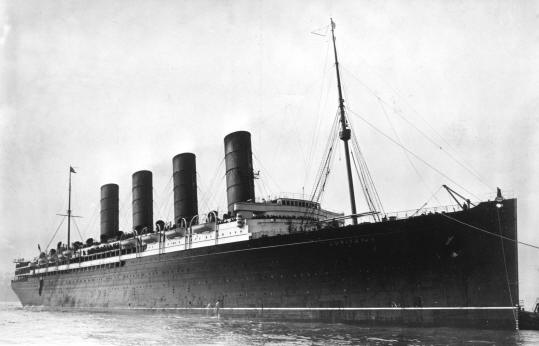
RMS Lusitania
A British official today said that as the British government grant ships of other nations the privilege of using the Union Jack to escape capture it naturally feels that a similar privilege would be granted to its ships in a similar emergency.
The Administration’s view of the hoisting of the American flag on the British steamer Lusitania is that the use of other flags by ships of nations at war is such a customary practice that no formal protest could be made.
In a note to Great Britain the United States pointed out that the use of the American flag by British vessels would be highly dangerous to neutral vessels and would be viewed by this government with anxiety. In a separate note to Germany, the United States warned that the torpedoing of an American vessel by a German submarine
might lead to a change in the heretofore-friendly relations between the two countries.
German government officials in Washington however said that belligerent ships continued unchecked use of the "Stars and Stripes " could not but result in disaster too American vessels.
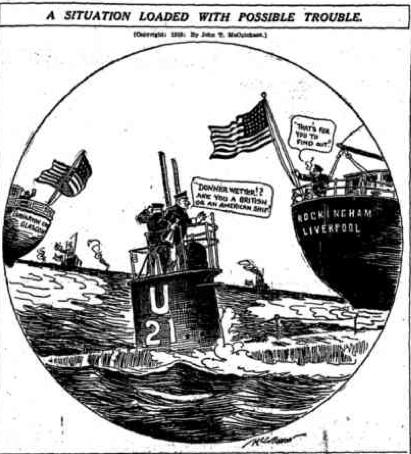
Reports from Austria state that the price of bread has gone from 14 cents to $.50 a loaf. Grain markets and Austria are said to be in a desperate condition. The bread now being sold is made up largely of substitutes for flower. Residents of Vienna are said to be complaining of the constantly increasing prices asked for meats.
Hogs are now reported to be almost unattainable.
Meanwhile in England, in view of the increasing cost of food, the English parliament voted on a policy to grant the government control of foodstuffs and coal. While the resolution was defeated, there are strong views that immediate action is necessary, as prices are increasing daily.
Meanwhile the Germans have announced they are prepared to allow prisoners to starve if Great Britain's plan to cut off food supplies to Germany is implemented. "Allied prisoners of war must starve first. We have 600,000 prisoners, and in occupied Belgium and France, another 11 million people. If it comes to starving, the
subjects of hostile countries will suffer first."
The event of immediate importance in the East is a German victory in East Prussia, which according to Berlin reports, was in overwhelming one. It is assumed in Germany that the danger of Russian invasion in that region it ended, but it is not yet clear to what extent the conduct of the campaign will be affected.
The battle in the Carpathians, which is to decide whether the Russians will be able to force it’s way over the mountains and invade Hungary or driven back to the northward, apparently is as far from a decision as it any time since the Austrians, with their German reinforcements, launch a counter attack. Each of the opposing
armies has won its minor victories but neither has been able to gain sufficient headway to place the other definitely on the defensive.
Germany and Austria have declared Poland to be an independent state, and no longer part of the Russian Empire. Plans call for holding a convention at Kraków, for the purpose of choosing a King. It is stated that Archduke Karl Stephen of Austria is a likely
candidate for the throne. Germany has said it will cede its province of Silesia to the new Polish state.
Resolutions in favor of joining the allies in the European war have during the past two days been adopted by more than 2,000 Italian societies. The Italian Premier has held almost daily conferences with his Ministry of War, the results of which have been placing of the entire Italian army on a war footing. The Italian public
is insisting that the country regained territory now held by Austria.
The situation in the Balkan states appears to be rapidly crystallizing. Bulgaria is set to receive another consignment of her German loan within the next few weeks.
The allies seem quite satisfied that Romania will ultimately join their side. It is believed that a condition placed by Germany on its loan to Bulgaria is that Bulgaria will attack Romania in the event of a Romanian attack on Austria.
February 15
The German government, in a note presented today to the State Department, announced its willingness to consider reversing its intentions of attacking British merchantmen provided Great Britain would cease from efforts to prevent foodstuffs from reaching the civilian population of Germany.
The German note adds that the Berlin government has information that British merchant vessels or being armed and have orders to sail in groups for protection, and further they would try to sink submarines. It declared that there was now no question of searching them, but the result would be the German ships would sink them,
because they are now held to be warships.
The note declares further that Great Britain, according to information of Germany, intend to use neutral flags, and therefore all shipping would be in danger in the war zone. The German chancellor says that in most cases German submarines will be unable to distinguish between neutral and British vessels encountered in the war
zone, and that all merchant therefore run the risk of destruction. It was urged, therefore, that neutral shipping adhere to Germany’s request and go around the north of Scotland, which has been declared outside the war zone. In Berlin statement also suggesting that British submarines my purposely sink neutral vessels, in order to precipitate a
conflict between Germany a neutral nations.
England announcement of her retaliatory policy of the German blockade by shutting off all German food supply from the outside has the potential of drawing in many currently neutral countries, like the United States, into what is currently a European war.
Berlin is again celebrating the success of Field Marshal von Hindenburg, as further details of the East Prussian operations are received. 50,000 Russian prisoners were taken when the Russian 10th army, consisting of 11 infantry and several cavalry divisions, was encircled and forced to surrender. The Russians are still being
pressed further eastward.
It is believed the re-occurrence of the general German offensive in the western theater depends largely upon the outcome of the present eastern situation. Opinion here if divided whether the Germans are planning a great invasion of Russia or whether their chief desire is simply to free Austrian territory of Russian forces and
make secure their lines in central and northern Poland.
The attacks of the allies in the West, supposedly to prevent the Germans from developing their offensive movements in Russia, have led to several engagements at several points in Belgium and France. But little land was exchanged.
Reports that Serbia has been invaded by a strong force of Albanians may bring Italy and Greece into the war. The Albanians have crossed the frontier of Serbia in great numbers and the Serbian forces have been forced to withdraw.
British and French battleships launched a massive attack on Turkish positions at the entrance to the Dardanelles, the narrow strait separating Europe from Asia in northwestern Turkey and the only waterway linking the Mediterranean Sea to the Black Sea.
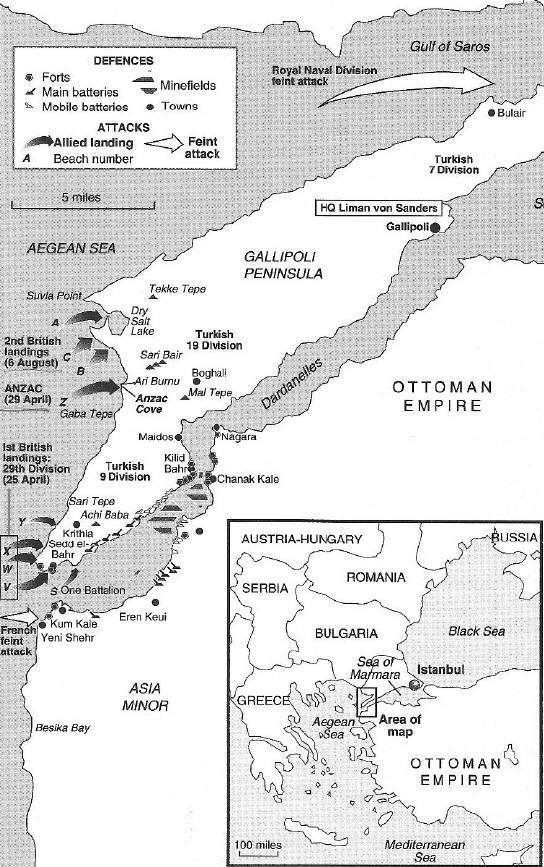
The bombardments made little initial impact, as the Turks were not caught unaware as they had long known an attack on the Dardanelles was a strong possibility and had been well fortified by their German allies. Turkey's entrance into the war on the side of the Central Powers isolated the Russian navy from the Allied naval
forces, preventing cooperation between the two, as well as blocking passage of Russian wheat and British arms back and forth.
Reports of a great Turkish victory in Egypt, printed in letters of gold, have been posted in Jaffa. The people have been told that the Suez has been occupied by the Turks who are now marching on Cairo. Graphic descriptions of sunk British cruisers in the Suez Canal caused great jubilation. The Turkish casualties in these
engagements were given as 10 men killed and 25 wounded.
The German steamer Holger is headed for Buenos Aires with crews of several English steamers captured by some German warship, probably off coast of Brazil. The Holger has been identified with German activities in the South Atlantic.
The Canadian government has requested that the United States post guards on all border crossings between Canada and the United States. The request was to prevent German sympathizers from entering Canada and attacking key Canadian industries vital for the war effort.
Germany and Austria complained to the State Department today that submarines were being built in the United States for Great Britain. The German Embassy said: "Plants of the Bethlehem and the Union Iron Works are sending the component parts of submarines, ordered by the British government, to Canada. Submarines are also being
built in Boston and Seattle." The attention of the United States Department has been drawn to these facts by the Germans and Austro-Hungarian as being in contradiction with the laws of neutrality.
February 23
The second week of Germany's submarine campaign opened this week with a loss of two more British ships. In the past week 10 vessels, seven of them British, have been sent to the bottom.
Word has been received that the American ship Carib has been sunk by a mine. The German Admiralty has pointed out that the destruction of the American steamer was due to them not following the course prescribed. The German government reiterated the safety of prescribed courses through German minefields and reissued the courses
which vessels bound for German ports should folow in order to be perfectly safe.
A German submarine which for the past few days has been lying in the English Channel in wait for ships fired a torpedo at the steamer Victoria. The captain of the Victoria, however saw the characteristic wake made by the torpedo and slowed down his vessel, and the torpedo passed harmlessly about 100 feet in front of her.
The French were notified of the submarine’s attack and a torpedo boat belonging to the French navy found the submarine the next morning and opened fire, scoring several hits before the submarine was able to dive. A wide patch of oil was seen afterwards on the sea at the spot where the submarine disappeared, and it is assumed
that the submarine was wrecked.
The American proposals for cessation of submarine warfare and the admissions of foodstuffs to Germany are before the German and British governments but there are no indications whether they will find acceptance.
The Russian have admitted that their 10th Army has been destroyed as a result of the recent German victory in East Prussia. It is estimated that more than 100,000 Russians, including seven generals, were captured.
There have been no important changes on the main battlefields of the west or east. In London the opinion is growing that the Germans are soon to make a great general attack in France, remaining on the defensive in Poland. Russia on the other hand fully expects another German drive towards Warsaw.
The fighting in the Carpathian Mountains between Russians and Austrians and their German allies is becoming rapidly much like siege warfare. Over 200,000 men had been fighting hand-to-hand in trenches without making any material advance. During the night of February 19, the Austrians picked up 8,600 wounded and over 3,000
dead. The wounded had been lying on the ground some of them for 18 hours without food or medical assistance.
British naval forces again entered the Dardanelles straits. This time the Ottomans evacuated the outer defenses and the fleet entered the straits to engage the intermediate defenses with the intent of destroying the batteries defending the minefields in the upper waterway. Without neutralizing the minefields the allied fleet
cannot move forward with its plans to capture Constantinople.
The Russians are concentrating large forces at Odessa, in readiness to move them to Midia on the Black Sea, 60 miles northwest of Constantinople, with the intent to join the British and French attack on that city. An attempt on Constantinople is expected soon. The Sultan has made plans for a hasty departure from Constantinople
wants an attack is made. Once the waterway is in possession of the Allies, a vast amount of Russian wheat would come out from the Black Sea and be distributed to ports in France and England.
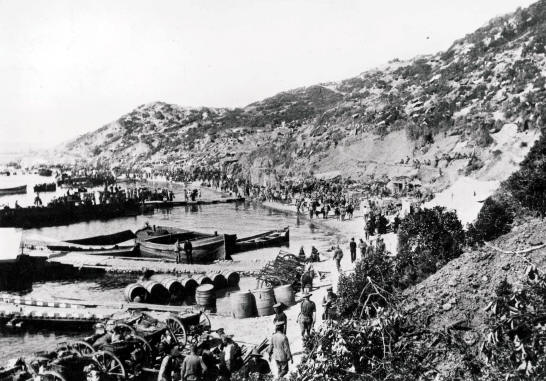
Austrian troops coming ashore at Gallipoli
With tensions between Turkey and Greece rising, Turkey has asked the Bulgarian government if it would permit Turkish troops to pass through Bulgarian territory for an attack upon Greece should war be declared. The Bulgarian government stated that neither country would be permitted to transport troops across its territory.
Three new German submarines arrived by railroad yesterday at Pola, the chief naval station of Austro-Hungary, and will begin operations not only in the Adriatic but the Mediterranean. A dispatch from Munich says that Germany is arranging to send several other submarines to Austria.
Clashes between fractions favoring and opposing war continue to create disturbances in Italy and the plan of the government to suppress public meetings for the discussion of this question led to a turbulent scene in Parliament. The Italian Premier defended Italy's policy of watchful neutrality.
Read past editions of News Reports From the Front
Have a newspaper clipping on a event that took place in Emmitsburg?
If so, send it to us at history@emmitsburg.net
|